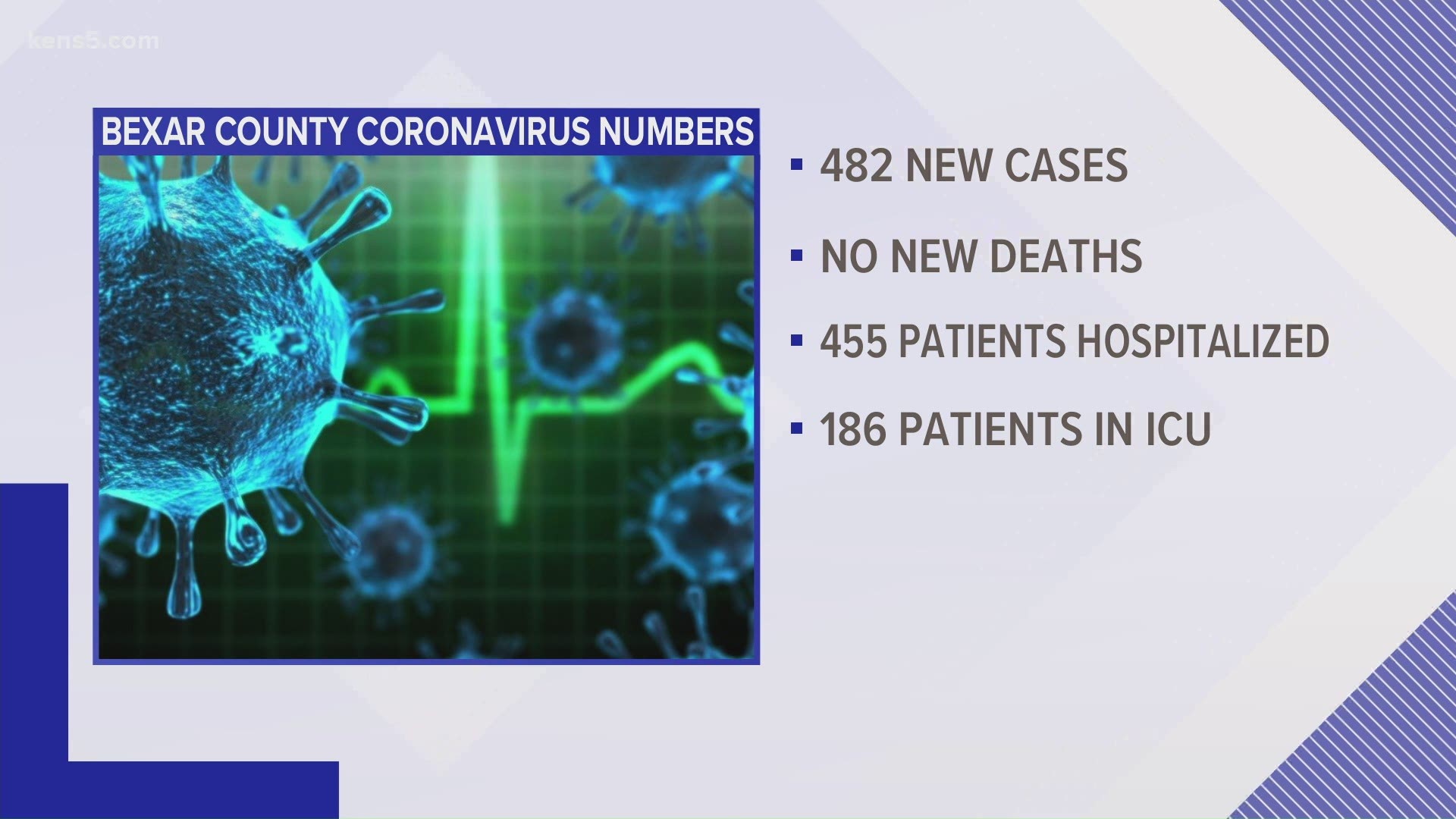SAN ANTONIO — We're tracking the latest numbers from the coronavirus pandemic in San Antonio and across Texas. Here are the latest numbers reported by Bexar and surrounding counties:
- Bexar County: On Saturday, 482 new cases were reported, bringing the total number of cases to 195,719. No new deaths were reported, so the local death toll remains at 2,520.
- Hays County: On Friday, officials reported 46 new cases in the county and one additional COVID-related fatality. There is now a total of 16,270 lab-confirmed local cases, while the death toll increased to 213. Officials estimate 15,577 residents have recovered, while 480 are still ill with the virus on this date.
- Comal County: Officials reported 49 new cases and eight additional COVID-related fatalities on Friday. As of Friday, 9,083 total COVID-19 cases have been reported, including 4,773 confirmed and 4,291 probable cases, while 292 county residents have died due to COVID-19 complications.
More county case information is available through the Texas Department of Health Services COVID-19 dashboard.
How Bexar County is trending
We've tracked how many coronavirus cases have been confirmed in Bexar County from the time officials began reporting cases in March 2020. The graphic below shows the number of cases since June and charts those daily case numbers along a 7-day moving average to provide a more accurate picture of the overall coronavirus case curve in our area and the direction we're trending amid the pandemic.
On Saturday, Metro Health updated its online coronavirus-tracking dashboards to reflect an additional 482 cases in Bexar County; in all, 195,719 county residents have been diagnosed in the pandemic.
Meanwhile, the local death toll from virus complications remains at 2,520 after no new fatalities were reported by health authorities.

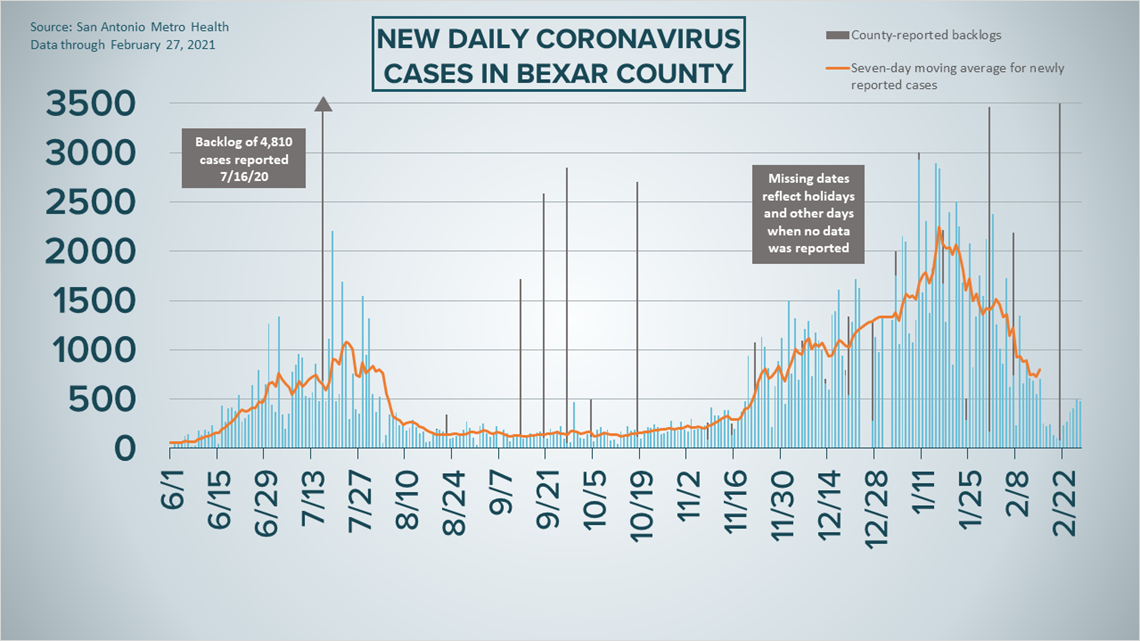
Hospitalizations continue their downward trend, decreasing by six overall to a total of 455 as of Saturday for Bexar County. Since Tuesday, hospitalizations have fallen by 20% in our area.
Of those 455 patients, 186 are in intensive care and 109 are on ventilators; both of those numbers are up from Friday, despite the overall decrease in hospitalizations.

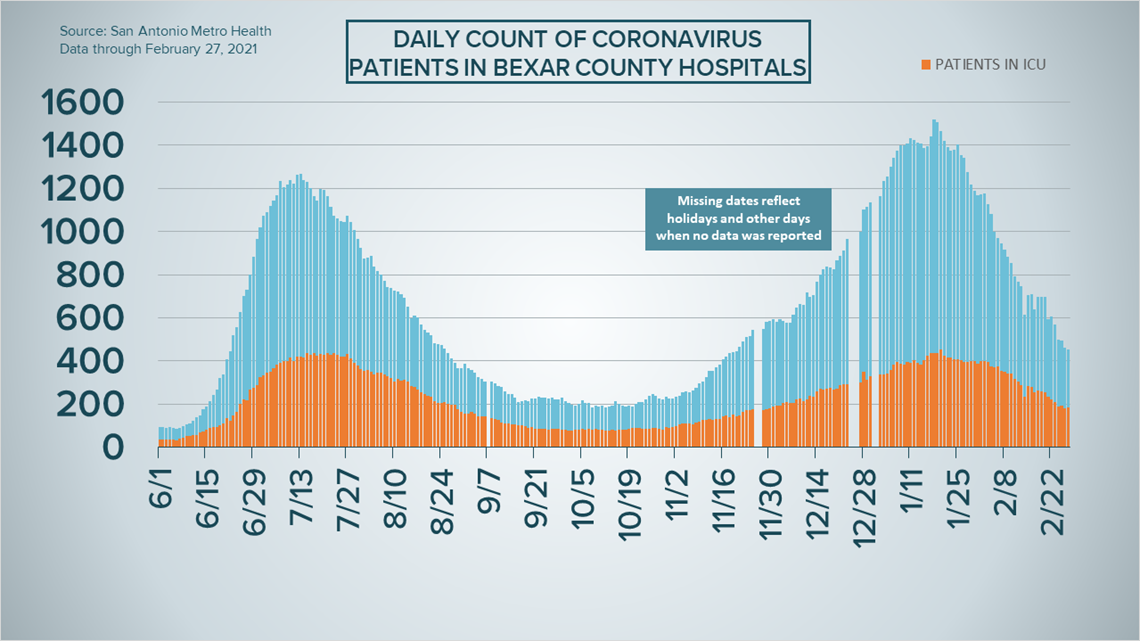
Coronavirus in Texas
The total number of novel coronavirus cases in the state since the pandemic began grew by 11,093 on Saturday, according to the Texas Department of State Health Services. That total includes 5,687 new confirmed cases, 2,416 new probable cases, and a backlog of 2,990. More details can be found on this page.
Saturday's figures bring the total number of Texans diagnosed with COVID-19 to more than 2.64 million.

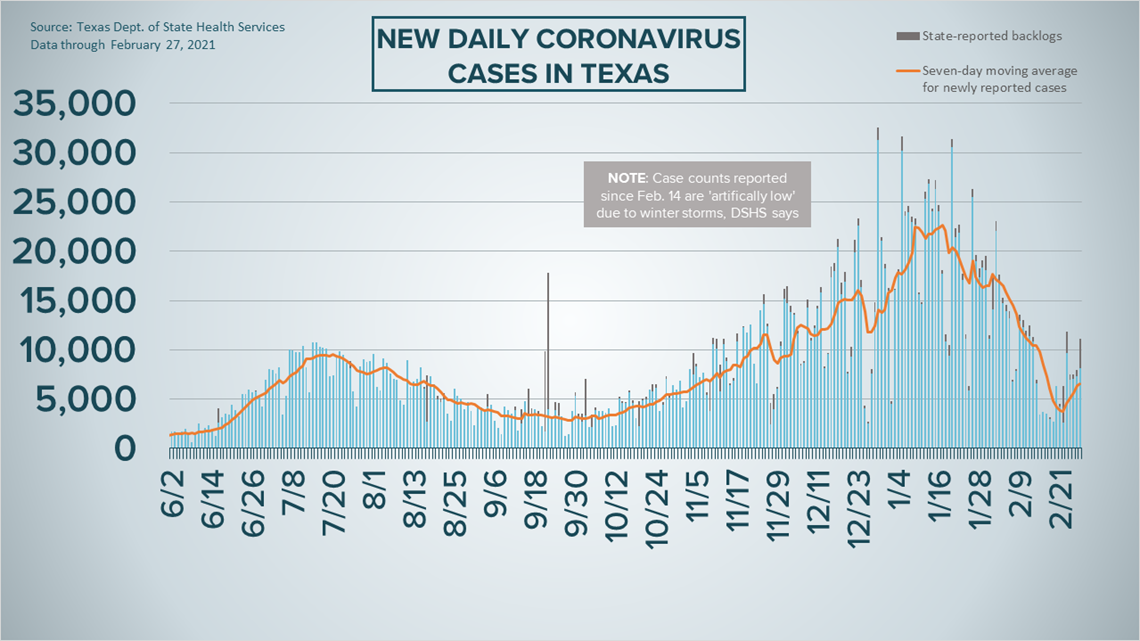
Meanwhile, state health authorities reported an additional 164 deaths from coronavirus complications in Texas. In all, 42,739 Texans have died from COVID-19.
Texas hospitalizations continued to fall on Saturday, the overall figure decreasing by 273 in the last day to 5,912 COVID-19 patients receiving treatment for their symptoms in the state. Hospitalizations in the state peaked on January 11, when 14,218 were seeking COVID-19 treatment. That number has diminished by more than 58% over the past 47 days.
The state, meanwhile, estimates that about 2.417 million Texans have recovered, while 161,316 Texans remain ill with COVID-19.
The latest update from the Texas Education Agency showed that there have been at least 184,372 cumulative cases among staff and students on Texas public school campuses through Feb. 21. That number comprises 119,810 positive student cases and 64,562 staff cases. More information can be found here.

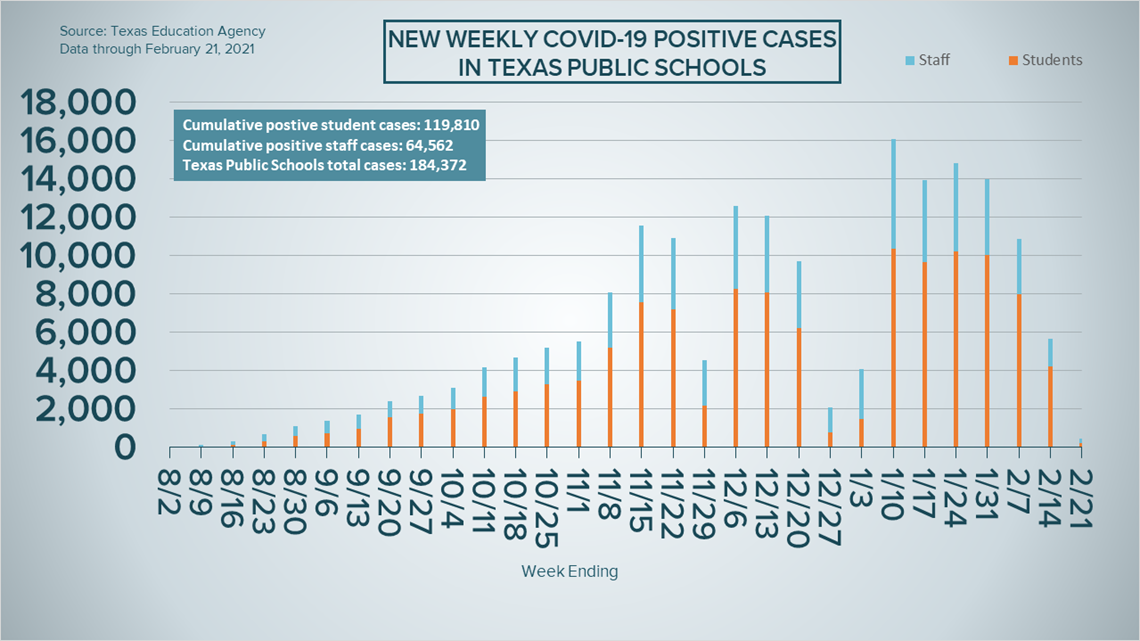
The TEA typically releases new data on school cases on Fridays.
Latest Coronavirus Headlines
- Biden hails House passage of $1.9T virus bill, now to Senate
- Third stimulus check: Potential timeline for $1,400 payments
- Reducing anxiety when returning to the office after coronavirus
- Nirenberg: 'It would be a big mistake' for state to repeal COVID-19 measures at this point in time
- Is the Texas governor planning to end the mask mandate? Some hope he waits
- 'Clearly the virus is not done with us' | CDC director warns gains on virus might be stalling
- Fauci: Whatever COVID vaccine is available, take it
- 20 million Americans have gotten both COVID vaccine doses
Coronavirus symptoms
The symptoms of coronavirus can be similar to the flu or a bad cold. Symptoms include fever or chills, cough, shortness of breath or difficulty breathing, fatigue, muscle or body aches, headache, new loss of taste or smell sore throat, congestion or runny nose, nausea or vomiting, and diarrhea, according to the Centers for Disease Control.
Most healthy people will have mild symptoms. A study of more than 72,000 patients by the Centers for Disease Control in China showed 80 percent of the cases there were mild.
But infections can cause pneumonia, severe acute respiratory syndrome, kidney failure, and even death, according to the World Health Organization. Older people with underlying health conditions are most at risk.
Experts determined there was consistent evidence these conditions increase a person's risk, regardless of age:
- Chronic kidney disease
- COPD (chronic obstructive pulmonary disease)
- Obesity (BMI of 30 or higher)
- Immunocompromised state (weakened immune system) from solid organ transplant
- Serious heart conditions, such as heart failure, coronary artery disease, or cardiomyopathies
- Sickle cell disease
- Type 2 diabetes
The CDC believes symptoms may appear anywhere from two to 14 days after being exposed.
Human coronaviruses are usually spread...
- Between people who are in close contact with one another (within about 6 feet).
- Through respiratory droplets produced when an infected person coughs, sneezes or talks. These droplets can land in the mouths or noses of people who are nearby or possibly be inhaled into the lungs.
- Some recent studies have suggested that COVID-19 may be spread by people who are not showing symptoms.
Help stop the spread of coronavirus
- Stay home when you are sick.
- Eat and sleep separately from your family members
- Use different utensils and dishes
- Cover your cough or sneeze with your arm, not your hand.
- If you use a tissue, throw it in the trash.
Find a Testing Location
City officials recommend getting a COVID-19 test if you experience fever or chills, cough, shortness of breath or difficulty breathing, fatigue, muscle or body aches, headache, new loss of taste or smell, sore throat, congestion or runny nose, nausea or vomiting, or diarrhea.
A self-screening tool is available to see if you need a test.
San Antonio operates several no-cost testing locations, including two walk-up locations open Monday-Sunday from 10 a.m. until 2 p.m.:
Cuellar Community Center
5626 San Fernando St.
San Antonio, TX 78237Ramirez Community Center
1011 Gillette Blvd.
San Antonio, TX 78224Additionally, Freeman Coliseum offers drive-through no-cost testing from Monday through Sunday between 9 a.m. and 4 p.m. An appointment is required and can be made either online or by calling (833) 213-0643.
Here's a Testing Sites Locator to help you find the testing location closest to you in San Antonio.

